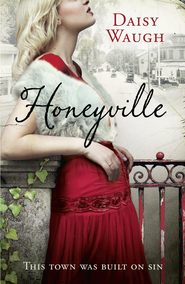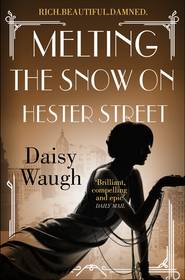По всем вопросам обращайтесь на: info@litportal.ru
(©) 2003-2024.
✖
Last Dance with Valentino
Автор
Год написания книги
2018
Настройки чтения
Размер шрифта
Высота строк
Поля
‘Hademak. Justin Hademak. From Sweden . . . ’
‘Hademak. Of course you are. From Sweden. How delightful. Lovely. Well, jolly good.’
Mr Hademak put my father into a taxicab. Papa and I kissed each other briefly, without eye contact. I was afraid I would cry. He muttered something – good luck, old girl – something feeble, and not in the least up to the occasion. I didn’t reply. Couldn’t. And then, as he was driven away, he turned back to me.
I remember his expression, I see it now: it was as if he was apologising, and not just for this unfortunate incident but for everything. He looked awful: like someone else entirely – someone so old and so exhausted with the disappointment of himself it allowed me, briefly, to forget my own abandonment, and wonder, for the first time, what might become of him without me. He needed me more than either of us realised, I think. The sight of him, shrinking into the chaos, tore at my heart. It still does. He lifted his hat to me through the glass, and I think he whispered, Sorry. If he did, it was the first and last time . . . He never apologised to me again. Never. And he left me there, alone, with the giant from Sweden.
After Papa had disappeared into the great cloud of the city, Mr Hademak became (if it were possible) even more frantic than previously. Afterwards, when I knew him a little better, I wondered if he hadn’t done it on purpose, charged on ahead in that crazy way, yelling out instructions and so on, if not as a kindness to me then at least to avoid the embarrassment of having to witness my collapsing into tears. I might have done it too – collapsed, that is – if he’d allowed me a moment to pause. I’m not at all sure I would have held myself together.
‘Excellent,’ he declared, without looking at me – with the trunk still balanced high on his shoulder. ‘We must get over to the island right away.’ (Ellis Island, he meant, of course: which island we had passed as we came in; and where the steerage passengers disembarked to have their immigration papers checked. And their hair checked, for lice, I think, too.) ‘We must get over there quickly, though, Miss Doyle . . . So keepup!’ I had to run to stay apace. ‘We have to pick out a new maid. You must help me with that, young lady. They’re all rotten. Since the war we only get now the bad eggs. But we mustn’t fuss. Madame wants her motor-car outside the home . . . So we must pick out the first one we see who looks at all good. It doesn’t matter a spot anyway. They never do stay long . . . ’
The journey to Ellis Island took our little boat back towards the great statue that had so exhilarated me only an hour or so before; the freedom it celebrated seemed to have taken on a more menacing significance since then. Liberty was more than simply an idea suddenly, and how I longed to have a little less!
In any case, we bobbed along, Mr Hademak and I. Mr Hademak was too impatient to wait for the little boat to dock and he disembarked, with those ridiculous spider legs, when there was still a yard or two of water before the quay. And then, even before his foot had touched solid land, he announced as loudly as possible to the milling crowd that he was looking for a housemaid.
Immediately the crowd surged forward but it only infuriated him. ‘No, no, no!’ he snapped. ‘Get off! Get away! No gentlemen today. Are there any Irish about?’ Then, momentarily cornered by the swell, he turned to me. ‘Miss Doyle,’ he bellowed over their heads, ‘don’t just stand there. Find us a girl! And a sweet one, mind. Madame hates them to look drab. Over there! See?’ He pointed behind me. ‘See the little group of Paddies over there? See the young one, with that terribly mad hair?’
The one with the hair – the unmissable, magnificent, golden-russet curls – was a girl of my age, maybe a little older. She was sitting on a black tin suitcase, slightly apart from the others, her sharp face turned towards us. She examined the blond giant, then looked at me. I smiled at her but she didn’t smile back.
‘THAT one!’ he shouted at me, pointing irritably, batting the people away. ‘With the mad, mad hair. YOU!’ he yelled at her.
The girl looked back at him.
‘Ask her if she’s looking for some work. DO IT!’ he shouted. ‘Before someone else takes her! The good ones get stolen too quickly.’
So I turned to her, very embarrassed. ‘The gentleman . . . you probably heard him. He wants to know if you’re— ’
‘Is it board, too?’
‘Why, yess! Most certainly it iss!’ Mr Hademak cried, bearing down on us, his long white face sweating with the effort of having shaken himself loose at last. ‘It is board. And a nice job, too. Twelve dollars a week. Better than you’ll get anywhere else. With days off. Two days a month off! Do you want it, young lady? No or yes?’
She laughed. ‘Do I want it?’ She held out a hand to us, and I can picture her face now, the relief in her eyes, even while she was trying to hide it.
‘You have family?’
‘Back in Ireland. I’m here on my own.’
‘Good. Like the rest of us, then.’ He glanced at me, rather shyly, I think. Perhaps, even, with a whisper of a smile. ‘Welcome to America, young lady. You have your papers?’
She nodded. ‘I was only waiting for a ride to take me to the city.’
‘Well, come along, then. Follow me. Hurry now. We can tell ourselves about names and everything else like that in the motor-car. Only we must hurry.’
He drove us at breakneck speed. It was all so new to me and yet, at the time, I was too wrapped in my miserable thoughts to take much notice. I suppose, before long, we had left Manhattan – I remember nothing of it, only the three of us tearing over a long, straight, impeccably smooth road to Long Island; a road that Mr Hademak was pleased to tell us had been built by a rich man as a car-racing track – until, after however many deaths, the racing drivers had refused to use it any more. He had cackled as he told us this, shaken his head at their eccentricity, and proceeded to drive faster along that dangerous road than I had – or have – ever travelled. Mr Hademak spent most of the journey shouting at us over the din of the engine. It made the veins stick out on his neck.
‘Well well well . . . it is quite a household you ladies are coming to. Miss Doyle – I don’t know what you may know of it already?’
‘Almost nothing,’ I replied bitterly.
‘Quite a household,’ he continued blithely. ‘We have some quite colourful individuals who come our way. Oh, yes, we are quite the entertainers at The Box – as our little house is called. You will be most amused!’
Amused? It seemed unlikely. Amused? To have travelled so far, so full of fear and hope, only to be abandoned? To have arrived in that mythical new city at last, only to be whisked away from it? Actually, at that moment, I felt not so much amused, but as if a great wave of self-pity were enveloping me and, I’m ashamed to admit, tears were already stinging. I’m not sure I had ever felt so lonesome in my life.
Fortunately, neither Mr Hademak nor the Irish girl – Madeleine – seemed to notice.
‘First, we have the master of the house,’ he announced, as the car flew on, swerving aimlessly from one side of the road to the other. Mr Hademak, bolt upright at the wheel, smiled secretly to himself, and I wondered if, after so many trouble-free days at sea, I might finally be travel sick. ‘Yes, indeed,’ he said, ‘and the master is truly quite some gentleman . . . And then we haf the little boy, of course – Jack Junior. Little Jack! Oh, but you will adore him! Quite the little man, he is! He is quite the little master! We all simply adore him. All the servants, and his papa and his mama too. He’s everybody’s favourite! Every single body in our happy little big house just so simply adores him—’
Suddenly Madeleine, the Irish girl, gave a loud and derisive snort. I stared at her. Last she’d spoken, she’d been telling us, with eyes lowered and trembling lip, how she’d come to America alone because her husband had been killed in the French trenches (later she told me she’d never been married: she’d been found in bed with the priest and hounded out of town). She seemed to have forgotten her grief quickly enough. She glanced at me and rolled her eyes, and it goes to show what sort of a hysterical mind I was in, because the next thing, with tears of self-pity still pricking my eyeballs, I was shaking with quiet giggles.
‘But you mustn’t think our life is only about the Little Man,’ Mr Hademak continued cheerfully. ‘Also we are quite the fashionable gathering. Though sometimes, when Madame is in the city, we are just the two of us: Father and Little Man. And then sometimes it is Mother and Little Man, when Mr de Saulles is in town. And then we have Madame and her amusing friends. Or Mr de Saulles and his amusing friends. Or Mr and Mrs de Saulles and their amusing friends. Yes, yes – it is all most amusing . . . We have counts and countesses of Europe. And Mr de Saulles sometimes brings along his Broadway – connections. And how lively they are! And even some of the stars from the pictures! No, no, not quite Miss Mary Pickford! Not quite yet! But we have an English duke. An English duke! And we have so many others. Dancers. Politicians . . . You might have read about them all quite often. In the yellow papers. Yess . . . ’ It was Mr Hademak’s turn to laugh helplessly. He rocked on his bony backside, this way, then that.
‘Sometimes,’ he continued finally, ‘I wonder if I know more about these fashionable individuals than they even quite know themselves . . . We are quite the fast set at The Box, you will discover. Oh, you will be most amused.’
‘And if you’ll excuse me for asking,’ interjected Madeleine, suddenly, ‘only I’m wondering – what’s the mistress like?’
–Ha. And if I had known the answer to that – would I have stopped the car?
Would I have thrown myself out onto that racing drivers’ rejected MotorParkway right there and then, hitched a lift with whatever vehicle came along, hauled my father from his delightful lunch at Sherry’s, and taken whatever employment anyone offered me? Perhaps.
She destroyed my father – what there was left of him to destroy. And she haunts me still – there’s barely a day goes by I don’t think of her, of the part I played or didn’t play, of what I saw and said, and didn’t see and should have said . . .
On the other hand, without her, I would never have befriended Rudy. Or ever have travelled to Hollywood. Nor Rudy either. Imagine that! Then who would the readers of Photoplay be drooling over at nights? Perhaps, in spite of everything, I should be grateful to her. Well, and maybe I am, but I hope she burns in any case – if not at Sing Sing, then in Hell when she finally gets there.
– – –
‘What’s the mistress like?’ asked Madeleine.
And I swear Mr Hademak blushed.
Dear God – three in the morning already, and still too damn hot to sleep! I have been writing all night so my arm is swollen. And my head is burning and my eyeballs ache . . . but I can’t stop. Not yet. Not until I reach the moment where Rudy and I are there in the garden, and we are standing in silence together, listening to the music, and I am wondering about Papa, and where he is, and worrying a little about his newest infatuation, but not as much as I ordinarily would because how can I when Mr Guglielmi – Rudy – is standing so very close beside me? And I don’t believe I have ever glimpsed a more handsome, more dazzling man in all my life.
And then he turns to me and he says, ‘It’s beautiful music, isn’t it?’ And his voice – his Italian accent was much stronger then but his voice was the same: that low, dark, beautiful voice. I can feel it through me. I didn’t recognise the music. I’m not sure that I had even fully noticed it was playing. And he smiled at me, and I thought how sad he must have looked before because the smile had such an effect, as if his face had been illuminated by a thousand million electric light bulbs, and he said, ‘Do you like to dance, Jenny?’
You made me love you . . .I didn’t want to do it. . . You made me want you. . . And all the time you knew it
Rodolfo Guglielmi was a professional dancer then: a dancer-for-hire. When the papers wrote about him – because of the divorce – they called him a lot of hateful names, and of course they still do. And of course he was no angel then. He is a long way from being an angel now, I suppose. But, Hell, which of us isn’t?
When he danced it was as if he moved through a different space from the rest of us: as if the air carried him; as if he had no weight at all. So I danced with him, still in my travelling clothes, in the moonlight, and with the music seeping through the warm night air. And I thought – I remember it so clearly – I thought, This is Life! Now I am truly alive . . .
What a gorgeous, magical place is this America!
– – –
Justin Hademak said it again, as we were turning into its long drive: ‘We are quite the fast set at The Box you will discover.’ It didn’t surprise me, knowing my father and the people he normally consorted with. Actually I would have been surprised if they had been anything else.
Nevertheless there certainly wasn’t anything very fast about Mrs Blanca de Saulles that afternoon. We arrived by a side door – Mr Hademak made us tiptoe into the back lobby, and he closed the door behind us as if a lion and her cubs were sleeping on the other side.
‘Sssh!’ he ordered. We hadn’t made a sound.











